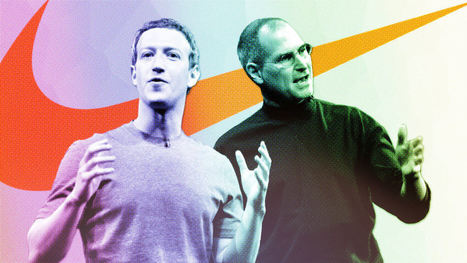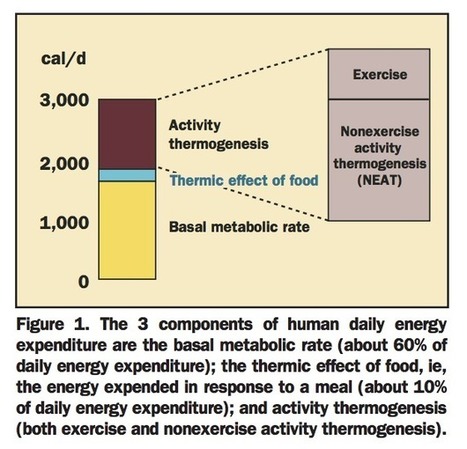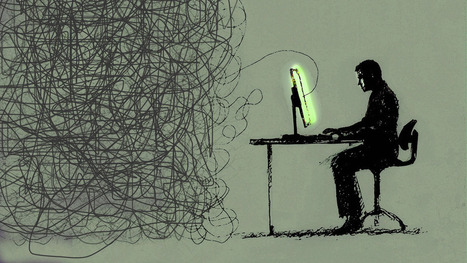 Your new post is loading...
 Your new post is loading...
If you’re always working for the weekend, you’re not alone. Just one-third of employees are actively engaged at work, leaving the majority of us unhappy on the job, according to the most recent State of the American Workplace Gallup poll. Instead of keeping an eye on the clock and the calendar, take the reins by creating a career that you love, experts suggest. “People often find themselves on a lifelong career journey without a destination in mind, only to look back at some point and realize they are not where they expected or wanted to be professionally,” says Tom Kemp, MBA executive-in-residence at the University of Richmond’s Robins School of Business. “Often this reflection happens when they either find themselves confronted with a job loss or they simply become so disenfranchised that they quit with little idea or thought about what they want to do next.”
Via The Learning Factor
It happens to high- and low-performing teams alike: The ties that bind everyone together just aren’t as strong as they could be. Maybe you’ve inherited a team that’s always been sluggish and uninspired, or one that’s usually steady, but the trust is eroding under pressure. Or perhaps you’re just trying to take your team to the next level. Whatever the case, every team needs to reflect once in a while on what could be improved. It’s human nature to be conflict-averse, but it’s every manager’s job to bring points of conflict out into the open and move forward together. Unfortunately, most meetings aren’t the best venues for doing that. Typical team meetings focus on planning what’s ahead–an upcoming project, the next quarter’s top goals and metrics, expectations moving forward. But there’s a simple alternative, focused on reviewing the immediate past, that can change how your team works for the better.
Via The Learning Factor
Are you a micromanager? You will probably say no. Maybe you self-deprecatingly call yourself a “control freak.” Or just “hands-on.” You just “care too much.” And it’s true: You do feel a certain need for a sense of control over your work. You are responsible, after all–perhaps more responsible than some of your coworkers or direct reports. You’re afraid of mistakes and believe that if something needs to be done well, you’d better do it yourself. But this isn’t just because you’re an “independent self-starter” who holds their work to a high standard. It might be that, too, but it’s probably also because you’re feeling stressed.
Via The Learning Factor
You can feel it start to happen–at first slowly, then all at once. You get a little bit tired and before you know it, you’re mindlessly scrolling your Facebook feed. You’re distracted and spent–you just can’t handle another minute of real work. You’ve hit the mid-afternoon slump. “Most of us are sitting all day, staring at a computer screen highly focused… you can’t sustain that for long,” says internist Lorraine Maita, MD, author of How To Live Younger. “At about 3:00 or 4:00 p.m., your cortisol starts to drop.” While our automatic reaction might be to reach for a bag of Sun Chips and watch a random YouTube clip, those behaviors will only prolong the slump. You will be better off if you try to reset your body and mind to help you regain focus. Maita recommends a number of activities, including listening to upbeat music or breathing deeply for a few minutes, to re-energize the body. Below are few more examples of how to get your focus back.
Via The Learning Factor
It’s 4 p.m. and you’re having a hard time focusing. So you stare at your computer and click in and out of lots of tabs. But when you look up, you see it’s only 4:03 p.m. Then, you get a glass of water, which takes all of seven minutes. You’re not feeling inspired to tackle something important, but ducking out early—or sitting at your desk and twiddling your thumbs for 50 minutes—aren’t options either
Via The Learning Factor
Of all our available resources, everyone has the same number of hours in a day. Some, however, happen to get more done. Are they faster or smarter? Do they have more help? Perhaps. But they’ve also learned tricks that can help them stretch time and eliminate the unimportant.
Here are six things super-productive people do every day to maximize their results and success.
Via The Learning Factor
You’d probably be lying to yourself if you said you’ve never gone into a new job and resolved to outperform your team’s expectations. You have plenty of good ideas and want everyone to know that you’re a genius of sorts. Most of the time, that mind-set’s great for your career—it pushes you to be your best day in and day out. But the problem is that some people think that motivating themselves this way gives them permission to push their teammates around. While your company hired you because you bring something unique to the table, that doesn’t give you license to be condescending about it. So if you want to convince your coworkers that you perform above your pay grade, here are a few mind-sets you should adopt ASAP.
Via The Learning Factor
Pay attention to what comes out of your mouth. The language you use affects how you experience your world, and how others experience you. Inevitably, things get "lost in translation." If you're familiar with cognitive distortion or cognitive bias, these psychology terms teach us that there are subtle ways that our mind can convince us of something that isn't really true. These inaccurate thoughts are usually used to reinforce negative thinking or emotions, thus holding us back. We all do this, both consciously and unconsciously, and how we do it provides pointers to our underlying beliefs about ourselves, our peers, partners and colleagues, and the immediate world around us.
Via The Learning Factor
. When Google acquired the online photo editor Picnik in 2010, CMO Lisa Conquergood and the rest of the Picnik team went, too. They worked on the site until Google narrowed its focus and closed Picnik in 2012. Still believing in the concept, the original Picnik team left Google and founded the photo-editing site PicMonkey. However, during her two years' tenure at Google, Conquergood got a chance to experience the productivity and workflow in one of the world’s most successful companies.
Via The Learning Factor
Time management is crucial for your success. Learn exactly how to be productive and how to best use your time with 29 amazingly actionable tips.
Via Barb Jemmott
Taking lots of breaks might not sound like the route to incredible productivity, but according to tons of research, giving yourself regular breathers is a sure-fire way to get more done. One study showed 20 minutes of yoga could significantly improve brain functioning, another that a quick nap would seriously boost memory, while a third suggested that just shy of an hour of work followed by around a 15-minute pause was the ideal work pattern. But what if you don't have 40 minutes to nap or even 15 minutes to kick back and reset? If that sounds like you, don't worry. Science has an alternative that even the most maniacally busy entrepreneur can take advantage of. According to a recent study out of Australia, even 40 seconds is enough to refresh your brain, as long as you do the right thing with those seconds.
Via The Learning Factor
We talk about happiness as if it were a thing to be discovered and acquired. But happiness can never be found externally. It is not a possession to be acquired or a set of conditions, but a state of mind. The happiest people don't necessarily have the best of everything, but they have learned to make the best of whatever they have. The happiest leaders aren't necessarily focused on success or failure but live by a different perspective--and that outlook makes all the difference. Here's how they live.
Via The Learning Factor
Perfectionists are often reminded that "done is better than perfect." But it turns out there’s another reason we should all try to create more "done" moments in our workdays. Saying the word done can help you get more accomplished on your to-do list. "Telling ourselves that we’re done creates not only an emotional reaction but a physiological response as well," says Leslie Sherlin, a psychologist, neuroperformance specialist, and the cofounder of the brain-training company SenseLabs.
Via The Learning Factor
|
Let’s not waste any time. The simple solution that we’re all looking for: It doesn’t exist. Want your business to thrive like Amazon’s? Want to emulate Steve Jobs or Mark Zuckerberg? Follow the road map of Nike or Warby Parker to build the next brand that matters? Sorry, it doesn’t work that way. What succeeded for them may not work for you. Too bad. Get over it. One-size-fits-all strategies just aren’t effective in today’s age of flux (and maybe they never were). That’s one of the insightful messages in senior writer Austin Carr’s feature The Future of Retail in the Age of Amazon. It’s become common practice to refer to billion-dollar startups as “unicorns,” but there is no more one-of-a-kind business than Amazon: hard-driving, customer-focused, yet broadly directed, from books and groceries to entertainment, consumer electronics, and web services. Carr explains that competing with Amazon today–trying to beat it at its own game–is largely a fool’s errand. Instead, what increasingly defines retail success, and points the way toward the businesses of tomorrow, is a bespoke model, one that is crafted to deliver on a focused need, proposition, or brand essence.
Via The Learning Factor
Leadership challenges are more complex today than ever before, and one leadership challenge that I see as an executive coach is the tendency to anticipate what might happen tomorrow while forgetting about what is happening today. In other words, leaders try to outthink and overanalyze the future. They anticipate all the possibilities that could happen, select the outcome most likely to occur and then mold their leadership style to accommodate it, only to find that Murphy has a full-time job and is apparently dedicated solely to them — and Murphy wins.The point is, tomorrow, next week or next year are all uncertain, so if you try to mold your leadership style to the “most likely” option to occur, then you’re not leading, you’re contingency planning. Leaders don’t just think about the future, they think in it. Once they have a clear picture of what they want to see, where they want to be—as an individual or as a team — and why, they begin to mold the world around them to achieve it.
Via The Learning Factor
Some days you get to work early, work nonstop, and head home without being able to figure out what you actually accomplished. Everything rushes past you in a blur of emails, meetings, and errands, and your to-do list remains more or less untouched. You’re always going to have a few workdays like this no matter what you do. But if they start happening regularly, you may have a problem on your hands. If that’s the case, then it’s time to start looking for systematic failures, not just one-off fumbles. And ironically enough, the best place to look may be at your to-do list itself. What better record do you have of the tasks that you’re consistently failing to achieve? These are a few common to-do list items that might be getting in the way of your more important goals. If you can cut them out–even just for a day or two–you may be able to regain your footing.
Via The Learning Factor
LinkedIn, once your online resume, has morphed into your opportunity to introduce yourself to others and attract the attention of those who need to know you. However, mindsets are slow to shift, and those who still consider LinkedIn nothing more than a digital resume are missing out on some of the biggest opportunities LinkedIn has ever offered. In a world that is becoming more virtual, with remote work becoming the norm, LinkedIn often delivers your first impression. To make sure you come across as the wildly interesting, compelling, and accomplished person you are, focus on the following six elements of your profile.
Via The Learning Factor
How you spend your night can have a huge impact on the day that follows. Do you spend your time ruminating over issues? Or maybe you stress over something that didn't quite go right during the day. There's no doubt, how you think affects how you feel. This is particularly important at night as you try to unwind and prepare for rest. This sets you up for sleep which serves many vital purposes. When I look at my clients who achieve the most during their days and are happiest, they are the ones who have a healthy routine at night. They set themselves up for success the following day by thinking and acting in a particular way.
Via The Learning Factor
The internet is chock full of daily habits that will help your routine, but what about bad habits? Because habits are so ingrained into our daily routines, we often don't notice how harmful ones sneak in and ruin our success. Try eliminating the following habits from your life and see how your success in business and in life improve:
Via The Learning Factor
When the office is almost too much to stomach, music can deliver much-needed relief on the job. Before you press Play, however, have a handle on when your tunes will be most beneficial for you and your brain. Learning = Stop Learning requires your brain to analyze and remember instructions and facts. When music is on, however, your brain has to process auditory data on top of processing the instructions and facts. Because of this multitasking, the brain can interpret the instructions and facts improperly, either associating them in odd ways or making mistakes about what's important enough to store. Thus, if you have to learn something at work, it's best to turn off your music, especially if you're learning verbally or through reading and the music has lyrics. Noisy = Play If your workspace is noisy, the brain will try to handle all the individual pieces of data in the noise. All that data processing takes energy you otherwise could use to focus on your job. It also increases levels of the stress-hormone cortisol and decreases levels of dopamine. Those hormonal changes negatively affect the prefrontal cortex, hindering executive function. Thus, productivity can go down, even if doing your required task doesn't require you to learn. In this scenario, listening to music can actually help, because it blocks out the other excessive input that could overwhelm you and keeps you calm.
Via The Learning Factor
It’s 9 p.m. and you suddenly remember that you wanted to ask your employee about an upcoming project. Before you fire off an email, ask yourself, "Is this urgent?" If you’re sending the email simply because you don’t want to forget, your employee may not know your response expectations, and this can cause stress that negatively impacts your staff’s productivity and performance. In a new report called "Exhausted But Unable to Disconnect," professors from Lehigh University, Virginia Tech, and Colorado State University found that an "always on" culture may prevent employees from fully disengaging from work, causing stress. "It’s easy to depersonalize people when you’re using email, because you don’t see the effect you’re having," says coauthor William Becker, associate professor of management at Virginia Tech. "When boundaries are blurred, it can create all kinds of problems. A lot of companies see the good parts of using email, and don’t think beyond that." In the study, participants reported spending an average of eight hours a week doing company-related emails after hours. The greater the amount of time spent on after-hours work, the less successful the employees were at detaching from work. This translated into poorer work-family balance, and even contributed to emotional exhaustion, which Becker says has been shown by prior research to negatively affect job performance.
Via The Learning Factor
Our society is collectively obsessed with morning routines. What is just as important, but often neglected, is how we manage what happens in the middle of the day. When we wake up, our minds are clear, our bodies are rested. High willpower gives us the energy to take on the day. The problem is that no matter how much energy we start with, it can only sustain us for so long. Without good mid-day habits, we fall prey to distraction (hello Facebook!), impulsivity, irritability, and fatigue. Or even worse, we crash and make bad decisions we regret. According to renowned willpower researcher Roy Baumeister, "Most things go bad in the evening. Diets are broken at the evening snack, not at breakfast… Impulsive crimes are mostly committed after midnight."
Via The Learning Factor
Time management is crucial for your success. Learn exactly how to be productive and how to best use your time with 29 amazingly actionable tips.
Via Barb Jemmott
It only takes seven minutes to change how you approach your day. Using the routine described below when you get to work will make a world of difference in your productivity, your attitude, your success, and your health. It's like the approach you make to the tee on a golf course. You plan out how you will hit the shot, which is more important than the actual swing. Before you start your day, this routine will provide the right mindset. Will you follow it? Note: I'm going to call this routine "The Seven," as in, "Did you do your Seven this morning?" Feel free to borrow that term or send me ideas on a better name.
Via The Learning Factor
No matter how much time we spend trying to optimize our inbox — from batch checking messages to adding bells and whistles — email takes over our lives. Looking at my stats from last month, I received and processed over 10,000 emails (eek!), so finding the right way to manage all this online correspondence has been critical for my day-to-day sanity. Turns out, though, the "right way" to manage email depends a lot on your own personal style. I've rounded up some of the most popular and successful strategies so that you can decide which one is best for you.
Via The Learning Factor
|



 Your new post is loading...
Your new post is loading...


















































What do you want to be celebrating at your retirement party? Making this list can help keep you motivated and excited about your future.